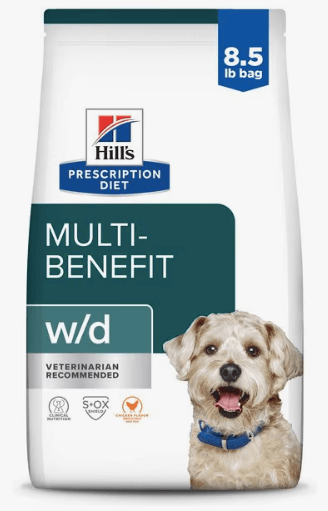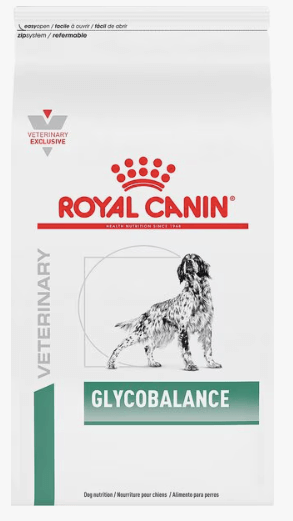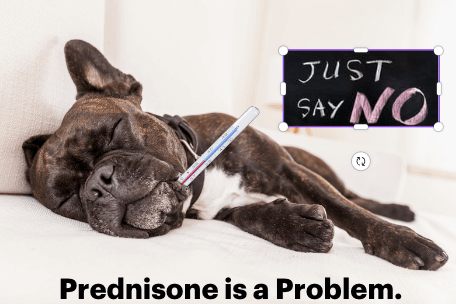Excess sugar is a killer. According to Dr. Karen Becker, DVM, "We know the top issues that dogs struggle with in North America are exacerbated by sugar." She continues to say that we know that cancer needs sugar as a fuel source; we know that sugar is a direct cause of type.2 diabetes and we know that fat doesn't make your dog fat or cause obesity.- carbs, sugar, and starch make your dog fat. Simply put, carbohydrates are literally molecules of sugar that the body breaks down into glucose. When excess sugar is consumed, it becomes stored in the body as fat for later user. If said fat is not actually used later, dogs are much more likely to become obese and sick later on. Excess sugar is a killer and it is found in most commercial kibble and wet food.
After eating, when an animal eats carbohydrates, the body breaks food down into glucose and it is released into the bloodstream. The pancreas responds to the glucose by releasing a hormone called insulin into the blood. Insulin binds to receptors on the surface of cells, which allows glucose to enter. The cells either use glucose for energy or store it for use later on. When there isn't enough insulin or cells don't respond to insulin optimally, glucose is unable to enter the cells and builds up in the blood, leading to insulin resistance, elevated blood sugar and ultimately diabetes. Excess sugar is a killer.
In addition to diabetes, consumption of too much sugar includes digestive issues, dental problems, weight gain / obesity, inflammation and yeast infections. Excess sugar is a killer.
Consumption of excess sugar, unfortunately like the amount found in most kibble products, is likely to cause health issues for your dog, especially as they age.
Pet food manufacturers are required to list all ingredients, which allows us to make informed choices when it comes to selecting the right food, if you feed kibble. Common high carbohydrate and high glycemic ingredients to avoid are white rice, brown rice, potatoes, tapioca, oats, barley, corn, wheat, beans, corn meal and peas.
So if we know excess sugar is a killer and dogs with diabetes suffer from impaired glucose tolerance, WHY DOES DIABETIC DOG FOOD HAVE SO MUCH SUGAR IN IT?!?!? 😤
Carbohydrates are a much cheaper source of calories, which keep production costs down. Unfortunately, most, if not all, traditional kibble companies could actually not care less about the health of your dog.
For example, here is the ingredient list from Hill's Prescription w/d Multi-Benefit Chicken Flavor Dry Dog Food that claims to be clinically tested nutrition formulated for multiple benefits: digestive health, weight management, blood sugar management and urinary health" and "helps metabolize fat, maintain lean muscle, and maintain a healthy weight with added antioxidants to control cell oxidation and promote a healthy immune system". Take a look at the ingredients listed below:

Whole Grain Wheat, Powdered Cellulose, Chicken Meal, Whole Grain Corn, Corn Gluten Meal, Chicken Fat, Cracked Pearled Barley, Whole Grain Oats, Chicken Liver Flavor, Dried Beet Pulp, Pork Flavor, Lactic Acid, Soybean Oil, Caramel Color, Flaxseed, Choline Chloride, Potassium Chloride, Glyceryl Monostearate, Potassium Citrate, Iodized Salt, L-Lysine, Vitamins (Vitamin E Supplement, L-Ascorbyl-2-Polyphosphate (Source Of Vitamin C), Niacin Supplement, Thiamine Mononitrate, Vitamin A Supplement, Calcium Pantothenate, Riboflavin Supplement, Biotin, Vitamin B12 Supplement, Pyridoxine Hydrochloride, Folic Acid, Vitamin D3 Supplement), L-Tryptophan, Calcium Carbonate, Dl-Methionine, Minerals (Ferrous Sulfate, Zinc Oxide, Copper Sulfate, Manganous Oxide, Calcium Iodate, Sodium Selenite), Taurine, L-Carnitine, Mixed Tocopherols For Freshness, Natural Flavors, Beta-Carotene.
The problem ingredients listed below will consistently spike blood sugar, which is the exact opposite of what you want for your dog and especially for dogs with diabetes. Excess sugar is a killer.
- Whole Grain Wheat: Grains do provide protein, fatty acids, carbohydrates, fiber B vitamins, magnesium and potassium. However, this is the first ingredient listed, which means it is used in the highest quantity. Although there could be some beneficial nutrients found in there, diabetic dogs 1000% do not need grains and the glucose spike that comes with it..
- Whole Grain Corn: Corn is another filler ingredient, with little nutritional value and is grown with a herbicide called glyphosate that is used to control weeds in corn and other crops. Corn is also considered.a starchy vegetable and diabetic dogs do not need the glucose spike hat comes with it.
- Corn Gluten Meal: Corn gluten meal is a protein-rich by-product from the wet milling process of corn. The protein component is good for a diabetic dog, but it has been highly processed, which increases the amount of AGEs in the food
- Cracked Pearled Barley: Cracked pearled barley is a good source of fiber, but is high in carbohydrates. Diabetic dogs do not need the glucose spike that comes with it.
- Whole Grain Oats: Whole grain oats are very high in carbohydrates and also grown with a herbicide called glyphosate. Diabetic dogs do not need the glucose spikes that comes with it.
- Dried Beet Pulp: Dried beet pulps are made from sugar beets. While high in fiber, it's literally a by-product of sugar. Diabetic dogs do not need said sugar.
- The rest of the ingredients: Are natural flavors, additives, preservatives, chemicals, refined seed oils and by-products that serve little to no health benefits and in fact, may be detrimental to your dog's health as hey are highly processed, genetically modified and most likely contain glyphosate.
Royal Canin's version of kibble designed to support improved glucose in dogs is called Veterinary Diet Adult Glycobalance Dry Dog Food, that claims to 'support healthy post-prandial blood glucose levels, maintain a healthy body weight via moderate fat content, includes reduced starch content and high protein to support muscle mass and is rich in antioxidants to maintain healthy and vitality. Despite claims, it is very unlikely that this particular kibble will actually help a dog with diabetes. Take a look at the ingredients listed below:

Chicken By-Product Meal, Barley, Corn Gluten Meal, Powdered Cellulose, Wheat Gluten, Dried Plain Beet Pulp, Tapioca, Chicken Fat, Natural Flavors, Fish Oil, Psyllium Seed Husk, Potassium Chloride, Fructooligosaccharides, Salt, Choline Chloride, Vitamins [Dl-Alpha Tocopherol Acetate (Source Of Vitamin E), L-Ascorbyl-2-Polyphosphate (Source Of Vitamin C), Biotin, D-Calcium Pantothenate, Vitamin A Acetate, Niacin Supplement, Pyridoxine Hydrochloride (Vitamin B6), Thiamine Mononitrate (Vitamin B1), Vitamin B12 Supplement, Riboflavin Supplement, Vitamin D3 Supplement, Folic Acid], Calcium Carbonate, Taurine, Trace Minerals [Zinc Proteinate, Zinc Oxide, Manganese Proteinate, Ferrous Sulfate, Manganous Oxide, Copper Sulfate, Calcium Iodate, Sodium Selenite, Copper Proteinate], Marigold Extract (Tagetes Erecta L.), L-Carnitine, Rosemary Extract, Preserved With Mixed Tocopherols And Citric Acid.
The problem ingredients listed below will consistently spike blood sugar, which is the exact opposite of what you want for your dog and especially for dogs with diabetes. Excess sugar is a killer.
- Barley: Barley is a cereal grain that can be a decent source of fiber as it includes soluble beta-glucan which can help to stabilize blood sugar. However, a diabetic dog truly does not need any kind of grain in their diet, including barley.
- Corn Gluten Meal: Corn gluten meal is a protein-rich by-product from the wet milling process of corn. The protein component is good for a diabetic dog, but it has been highly processed, which increases the amount of AGEs in the food
- Barley: Cracked pearled barley is a good source of fiber, but is high in carbohydrates. Diabetic dogs do not need the glucose spike that comes with it.
- Wheat Gluten:Wheat Gluten is a protein found in wheat, barley, and rye. a diabetic dog truly does not need any kind of grain in their diet, including wheat gluten.
- Dried Beet Pulp: Dried beet pulps are made from sugar beets. While high in fiber, it's literally a by-product of sugar. Diabetic dogs do not need said sugar.
- Tapioca: Tapioca is a starch derived from the cassava root. Diabetic dogs do not need any additional starch.
- The rest of the ingredients: The protein source is chicken by-product, which means that the chicken used in the kibble are the remains of the chicken after the better parts of the meat have been removed for human consumption. A diabetic dog requires a higher-quality protein source to continue to have the best quality of life as possible. Additionally, the rest of the ingredients are re natural flavors, additives, preservatives, chemicals, refined seed oils and by-products that serve little to no health benefits and in fact, may be detrimental to your dog's health as hey are highly processed, genetically modified and most likely contain glyphosate.
Dogs with diabetes will not thrive when eating starch, grains and fillers. Excess sugar is a killer.
According to this 2022 study that explored the effect of carbohydrate restriction in dogs. 36 dogs were fed a high carbohydrate diet for 4 weeks and then randomized to high protein, low carbohydrate or a high fat, low carbohydrate diet for 5 weeks and then dogs crossed over to the other food for an additional 5 weeks. "Generally, reduction of dietary carbohydrate by replacement with either protein or fat increased the energy required to maintain body weight, and fat had a greater effect. This study demonstrated that the reduction of carbohydrate in canine foods is potentially beneficial to dogs based on improvements in metabolism and supports the use of low-carbohydrate foods as safe and effective for healthy adult dogs." Excess sugar is a killer.
If you want your dog to live a long, happy and healthy life, stay away from sugar. Feed raw, home-cook, anything but kibble if you can avoid it because excess sugar is killer.
Donate to Bobzilla.org

$5.00
The veterinary business is business which is not in the business of curing your animal, but Bobzilla's business is. Bobzilla is committed to one hundred percent transparency in all of its scientific research into animal wellness and prevention of disease and one… read more




